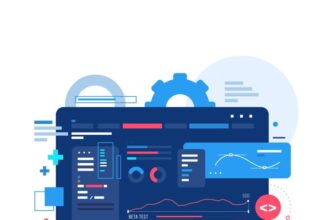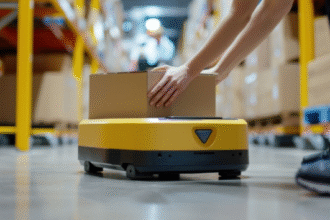The convergence of technology and artificial intelligence (AI) is driving unprecedented transformations across various industries. As AI evolves from theoretical applications to practical, real-world implementations, its impact is reshaping how businesses operate, how products are delivered, and how consumers interact with technology. Below, we delve into the key trends at the intersection of technology and AI, illuminating their role in revolutionizing industries.
AI in Healthcare: Revolutionizing Patient Care
Healthcare stands as one of the most profoundly impacted industries by AI. From diagnostics to treatment planning, AI is empowering medical professionals with tools that significantly enhance accuracy and efficiency.
- AI-Powered Diagnostics: Machine learning algorithms analyze medical data, such as X-rays and MRIs, to detect conditions like cancer or heart disease with unprecedented precision. These tools often outperform traditional diagnostic methods, saving lives by identifying issues earlier.
- Telemedicine Integration: AI-driven chatbots and virtual health assistants are transforming telemedicine by providing patients with immediate responses, scheduling appointments, and even suggesting preliminary diagnoses based on symptoms.
- Drug Discovery: Pharmaceutical companies leverage AI to accelerate drug development. AI models predict molecule behavior, cutting research time and costs dramatically.
Retail and E-Commerce: Personalization Redefined
Retail is witnessing an AI-driven revolution, as businesses adopt technology to understand and predict customer behavior.
- Hyper-Personalization: AI analyzes consumer data to recommend products tailored to individual preferences, enhancing customer satisfaction and increasing sales.
- Supply Chain Optimization: Machine learning models optimize inventory management and logistics, reducing costs and ensuring timely delivery.
- Visual Search: Image recognition technology enables customers to upload pictures and find similar products, creating a seamless shopping experience.
AI in Financial Services: Enhanced Efficiency and Security
The financial sector has embraced AI for its potential to reduce fraud, optimize operations, and improve customer experience.
- Fraud Detection: Advanced algorithms analyze transaction patterns to identify and block fraudulent activities in real time, protecting consumers and institutions alike.
- Customer Support: AI-powered chatbots offer 24/7 assistance for banking and financial queries, significantly reducing response times.
- Predictive Analytics: AI tools assess creditworthiness, predict market trends, and provide personalized investment advice, empowering clients with actionable insights.
Manufacturing: Automation and Optimization
AI and robotics are transforming manufacturing operations, leading to higher efficiency and reduced costs.
- Predictive Maintenance: AI systems monitor equipment and predict failures before they occur, minimizing downtime and increasing productivity.
- Quality Control: Vision-based AI systems identify defects in products, ensuring that only high-quality goods reach consumers.
- Smart Factories: IoT devices combined with AI enable real-time monitoring of production processes, optimizing resource utilization.
Education: Tailoring Learning Experiences
AI is transforming the education sector by making learning more personalized and accessible.
- Adaptive Learning Platforms: AI assesses individual student needs and tailors lessons to match their pace and style, ensuring more effective learning outcomes.
- Virtual Tutors: AI-powered tools provide additional support for students outside the classroom, answering questions and providing practice exercises.
- Accessibility Improvements: Voice recognition and translation tools enable learners from diverse backgrounds and abilities to access educational resources seamlessly.
Transportation: Driving Autonomous Innovations
AI is revolutionizing how people and goods move, with autonomous vehicles and smart transportation systems leading the way.
- Self-Driving Cars: AI systems process real-time data from sensors and cameras, enabling vehicles to navigate safely and efficiently.
- Traffic Management: Smart traffic systems analyze congestion patterns and adjust signals dynamically, reducing travel time and fuel consumption.
- Logistics Optimization: AI-driven route planning tools ensure timely deliveries while minimizing costs in shipping and freight.
Energy and Sustainability: Smarter Solutions for the Planet
AI plays a critical role in driving sustainability initiatives and optimizing energy consumption.
- Smart Grids: AI monitors and manages energy distribution, reducing waste and improving efficiency.
- Renewable Energy Forecasting: Machine learning models predict weather patterns to optimize solar and wind energy production.
- Carbon Footprint Reduction: AI-driven insights help industries reduce emissions by streamlining processes and adopting eco-friendly practices.
Marketing: Enhancing Engagement with AI Tools
Marketing strategies have been transformed by AI, enabling businesses to connect with audiences in innovative ways.
- Content Creation: AI generates high-quality content, from blogs to videos using an AI blog-to-video tool, tailored to specific audiences and keywords.
- Sentiment Analysis: AI tools analyze social media and customer feedback, offering insights into public perception of brands.
- Predictive Marketing: Machine learning identifies trends and optimizes campaigns, ensuring better ROI and customer engagement.
AI Ethics and Governance: Navigating Challenges
While AI offers immense potential, it also raises ethical concerns that industries must address.
- Bias in Algorithms: Ensuring fairness in AI models is critical to avoid reinforcing societal biases.
- Data Privacy: Organizations must prioritize the protection of user data while leveraging AI.
- Transparency and Accountability: Establishing guidelines for AI decision-making fosters trust and compliance.
The Road Ahead
The intersection of tech and AI continues to unlock opportunities across industries, reshaping how businesses operate and deliver value. Companies that embrace these innovations stand to gain a competitive edge, while those hesitant to adapt risk falling behind. As AI becomes more accessible and powerful, its role in transforming industries will only grow.

















